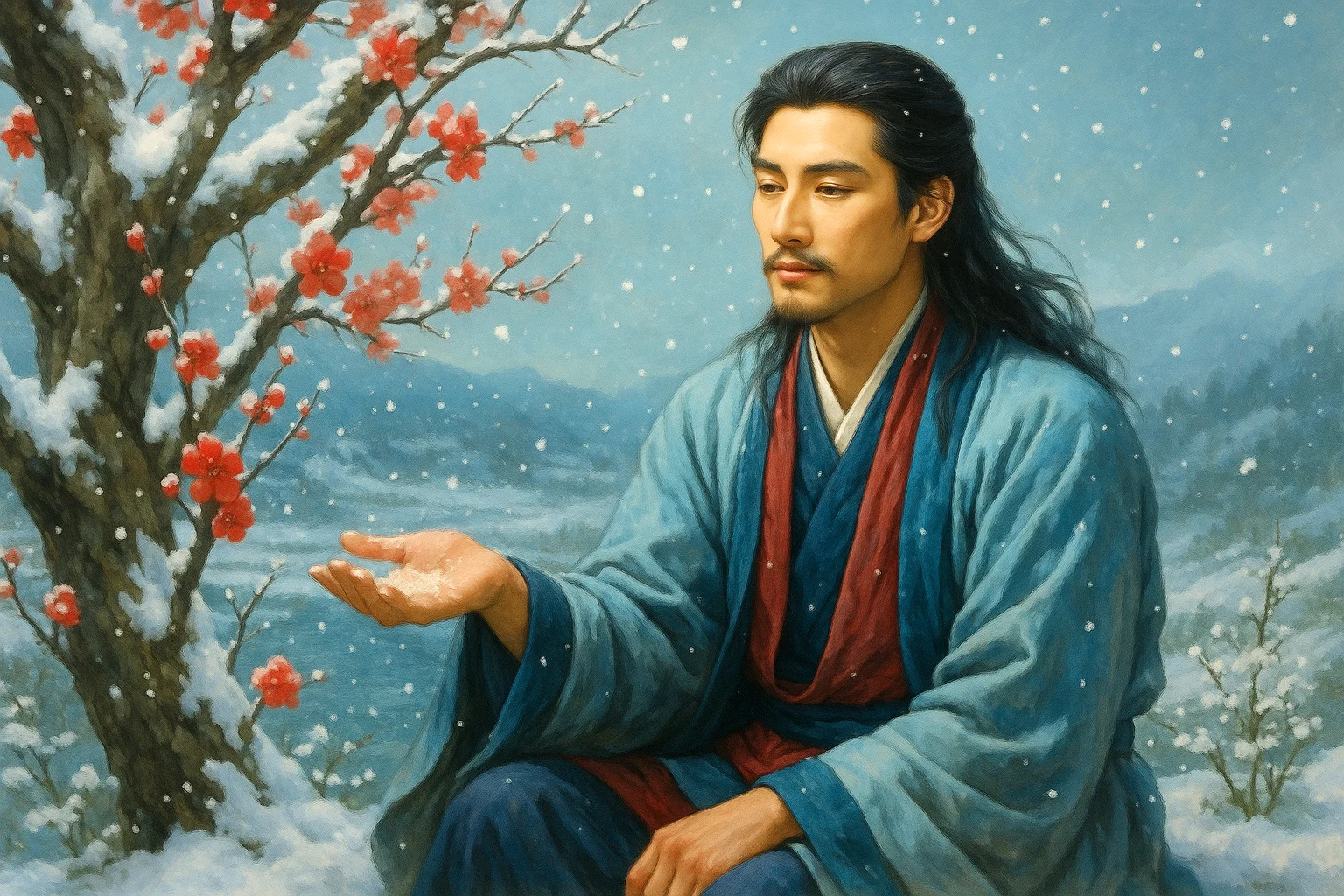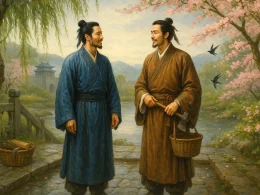The empty town's dawn horn resounds,
Through willow-veiled paths it winds.
On horseback, thin-robed, I shiver cold,
Surveying tender yellows and greens unfold -
All old friends from Southland, every hue.
In this deep hush, Cold Food Festival's due.
I force wine to the little bridge's lair,
Fearing pear blooms' fall will bring autumn's air.
Swallows dart, asking spring's retreat -
Only the pond lies jade in silent feat.
Original Poem
「淡黄柳 · 客居合肥南城赤栏桥之西」
空城晓角,吹入垂杨陌。
马上单衣寒恻恻,
看尽鹅黄嫩绿,都是江南旧相识。
正岑寂,明朝又寒食。强携酒,小桥宅,
姜夔
怕梨花落尽成秋色。
燕燕飞来,问春何在,
唯有池塘自碧。
Interpretation
Composed during the Chunxi era of the Southern Song Dynasty, this ci poem was written when Jiang Kui was lodging west of Chilan Bridge in Hefei's southern district. Though situated between the Yangtze and Huai rivers, Hefei was then near the northern frontier, its climate colder and scenery tinged with desolation. Against this backdrop of national fragility and personal career stagnation, Jiang Kui wandered from place to place, channeling his emotions into poetry. "Pale Yellow Willows" emerges as both a spring landscape sketch and a profound meditation on exile, longing, and national decline.
First Stanza: "空城晓角,吹入垂杨陌。马上单衣寒恻恻,看尽鹅黄嫩绿,都是江南旧相识。"
Kōng chéng xiǎo jiǎo, chuī rù chuí yáng mò. Mǎ shàng dān yī hán cè cè, kàn jìn é huáng nèn lǜ, dōu shì jiāng nán jiù xiāng shí.
Dawn horns echo through the empty town,
Down willow-lined lanes their mournful sound.
On horseback, thin-robed, chilled to the bone—
These gold-tinged greens I've wholly known,
All old friends from Jiangnan's springtime ground.
The opening establishes a stark atmosphere. "Dawn horns in empty town" (空城晓角) renders desolation hauntingly beautiful, while "willow lanes" and "thin-robed chill" merge scene and sentiment. The "gold-tinged greens" (鹅黄嫩绿), though vibrant, evoke nostalgia for Jiangnan's familiar springs—revealing the poet's homesickness beneath the surface.
Second Stanza: "正岑寂,明朝又寒食。强携酒,小桥宅,怕梨花落尽成秋色。"
Zhèng cén jì, míng zhāo yòu hán shí. Qiǎng xié jiǔ, xiǎo qiáo zhái, pà lí huā luò jìn chéng qiū sè.
In this deep hush, Cold Food Day nears.
I bring wine to the bridge-house, half-hearted,
Dreading how pear blossoms' fall might turn
Spring's hues to autumn's hues, departed.
"Deep hush" (岑寂) underscores solitude; "Cold Food Day" (寒食节) marks seasonal passage. The reluctant wine-bearing ("强携酒") shows perfunctory ritual observance, while "dreading pear blossoms' fall" (怕梨花落尽) crystallizes the poet's acute sense of transience—spring's fragility mirroring national and personal precariousness.
Third Stanza: "燕燕飞来,问春何在,唯有池塘自碧。"
Yàn yàn fēi lái, wèn chūn hé zài, wéi yǒu chí táng zì bì.
Swallows dart, asking where spring's gone—
Only the pond stays blindly, coldly jade.
The closing stanza drifts toward quiet despair. The swallows' unanswered question ("where's spring?") personifies nature's futile search for vanished vitality. The pond's "blind jade" (自碧)—persisting in indifference—becomes a metaphor for the universe's impassivity to human sorrow. This whispered finale elevates the poem from personal melancholy to universal resonance.
Holistic Appreciation
This lyric poem employs delicate brushstrokes to convey profound emotions, beginning with the willows, falling petals, pond waters, and swallows around the Cold Food Festival. Layer by layer, it paints the loneliness of a traveler in a foreign land. Facing the spring of Hefei, the poet sees not vitality but the familiar shadows of Jiangnan—reflections of old dreams and the unrelenting ache for a lost homeland. The scenery is rendered with quiet simplicity, yet the emotions run deep and nuanced. Without explicit lament, every line carries hidden sorrow, building progressively to express the wanderer's homesickness, spring's passing, and grief for a fading world—melancholic yet restrained, tender yet never stagnant.
Artistic Merits
Jiang Kui excels at embedding emotion in serene landscapes, with meticulous structure and composition. This poem particularly showcases his gift for crafting atmosphere. The opening stanza sets the scene, using color and movement to shape mood; the middle section pivots with the season, aligning feeling with the festival's rhythm; the closing lines depict swallows in flight and emerald ponds—simple imagery weighted with profound longing. The language is spare, the tone refined, unadorned yet exquisitely crafted—a quintessential example of "poetry where the self is present."
Insights
Truly moving literature rarely declares sorrow outright; instead, it borrows scenery to voice emotion and invests objects with hidden feeling. Even the most ordinary spring willow can mirror inner turmoil. In a distant, desolate land, a pale willow branch or a pond of springtime green is enough to summon boundless reflection. With its fresh, natural strokes, this poem articulates complex depths, embodying the Song lyric's artistic power—"words end, but meaning lingers on."
About the poet

Jiang Kui (姜夔, c. 1155 - 1221), a native of Poyang, Jiangxi, was a Southern Song Dynasty lyric poet and musician. He remained a commoner throughout his life. His lyrics are known for their ethereal and austere style, and his poetry is also highly regarded. Along with Fan Chengda and Yang Wanli, he is celebrated as one of the "Four Great Masters of the Restoration."












